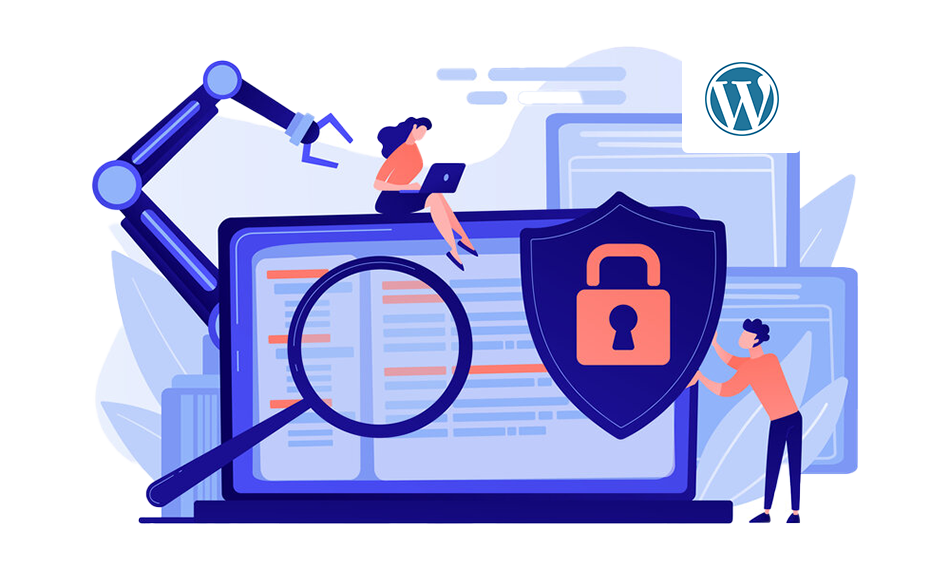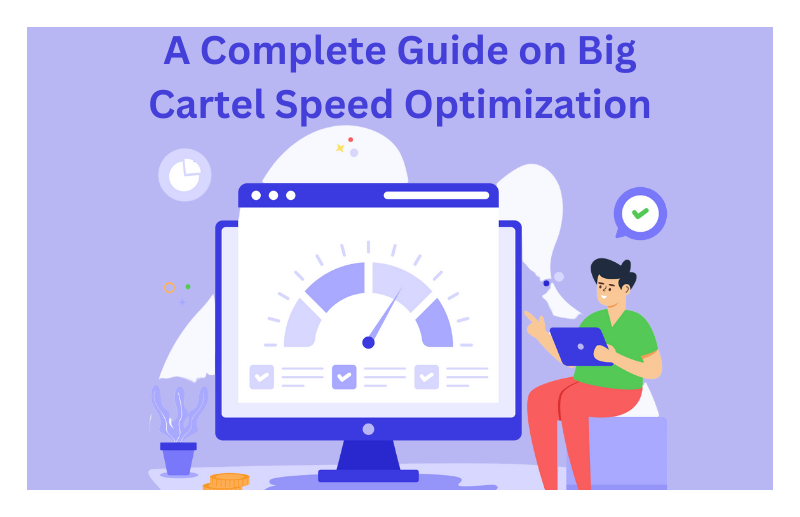TL;DR: WordPress powers over 60% of websites, making it a prime target for hackers. A malware attack happens every 39 seconds, leading to data theft, SEO damage, and costly downtime. While web hosts offer basic protection, serious sites need stronger defenses. The best WordPress security plugins provide malware scanning, firewalls, and cleanup tools to keep your site safe. In this guide, we review the top plugins for 2025 so you can choose the right one for your website.
The heart of your business is your website, and site security is needed more than ever. Unbelievably, a malware attack happens every 39 seconds, according to getastra. Hackers love to attack WordPress websites, which power over 60% of all websites. From stolen sensitive information to traffic hijacking, ruined SEO rankings, or defacing your website, the aftermath of a security breach can be disastrous.
Indeed, businesses usually face millions in losses in their downtime, cleanup costs, and reputational damage.
Web hosts provide basic security, high-value websites require more robust protection. This is where the WordPress security plugins come in, which can prevent attacks, malware, and clean up the infections effectively. But again, there are a myriad of different options to choose and selecting the correct one can be daunting.
We’ve filtered and reviewed the best WP security plugins that include malware detection, firewall protection, and malware cleanup. Each of these plugins are discussed in detail, with its pricing, strengths, weaknesses, and why they are a good fit.
In a hurry? You can quickly preview our top picks of security plugins to decide on the right security plugin.
| Plugin | Free Version | Premium Pricing | Best For |
|---|---|---|---|
| Sucuri | Free scanner (SiteCheck) | Starting at $229/year | Businesses wanting expert malware removal |
| Wordfence | Yes | Starting at $149/year | Small to medium websites, budget-friendly |
| MalCare | Yes, scanner & firewall only | Starting at $149/year | Comprehensive security for business & high-traffic sites |
| SolidWP | No | Starting at $99/year | Site security, backups, and management |
| Jetpack | Limited free features | Starting at $79/year | WordPress.com users & site maintenance focus |
| All-In-One WP Security (AIOS) | Fully free | Starting at $70/year | Beginners or hobby sites |
| Cloudflare | Yes | Starting at $20/month | Overall, the best WordPress security solution |
| CleanTalk Security | No | Starting at $12/year | Supplemental plugin to prevent spam & bot attacks |
Why You Need a WordPress Security Plugin?
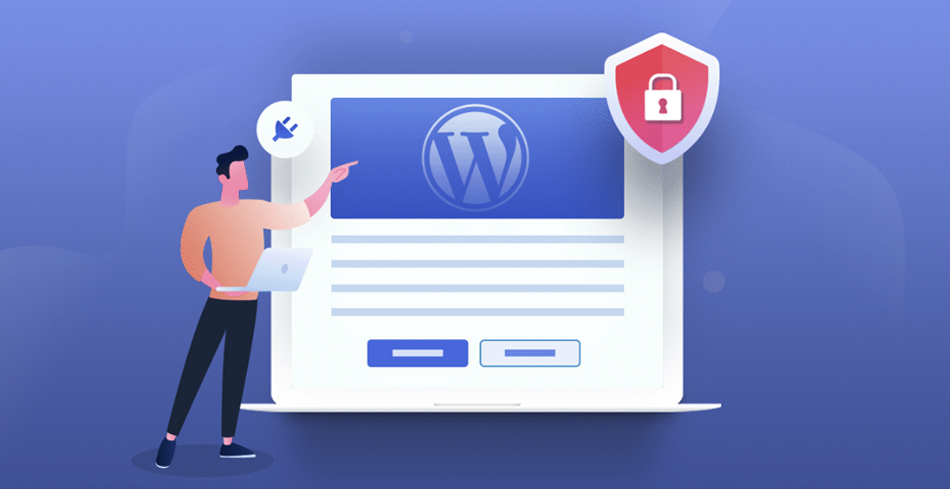
Before you dive into the plugins, you need to know why a security plugin is not negotiable:
- Avoid Malware Attacks: Themes, plugins, or outdated core files are possibilities that a hacker constantly looks for. A security plugin for WordPress is the one that tries to prevent malicious activity.
- Detect Hidden Malware: A lot of those plugins involve a scanner to verify files and databases against malware. Without a scanner, malware can silently damage your site.
- Automate Cleanup: This process is time-consuming and risky. Security plugins are able to aid in removing malware in a safe and productive manner.
- Firewall Protection: A firewall blocks malicious traffic before it gets into your site and minimizes the chances of infection.
- Protect Performance: Quality security plugins are optimized to protect your WordPress website without affecting speed or server performance.
In effect, a good WordPress security plugin will not only take care of the existing threats but protect them too, which will give you peace of mind.
Factors to Consider When Choosing a WordPress Security Plugin
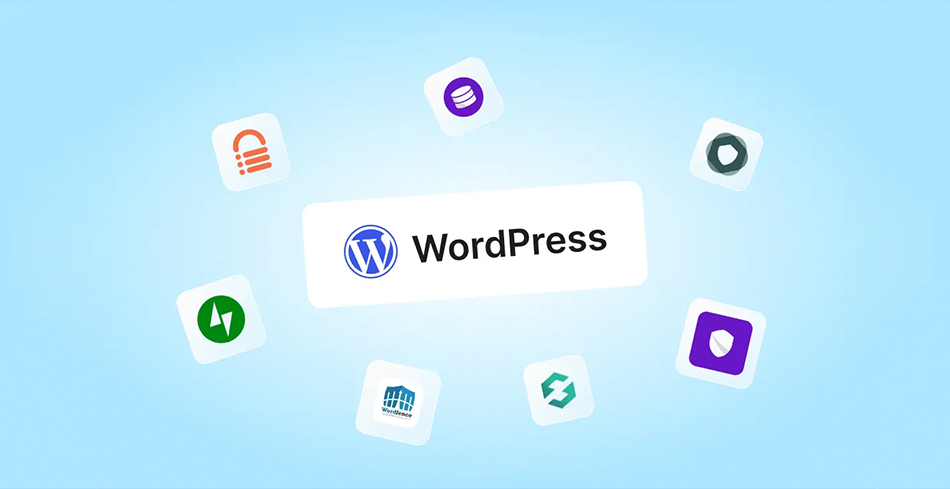
When selecting the appropriate plugin, pay attention to the following three main areas:
- Malware Scanning: Your plugin must detect malware in files, databases, and scripts. Without this, threats can go unnoticed.
- Malware Cleanup: Detection is not everything. Your plugin must be capable of removing malware fast and efficiently.
- Firewall: A Firewall blocks malicious traffic, which helps prevent attacks before they get to your site.
Additional “good-to-have” features include:
- Brute-force login protection
- Vulnerability detection
- Activity logs
- Two-factor authentication (2FA)
- Geo-blocking and IP whitelisting
- Scheduled scans and reports
A well-performing WP security plugin in these areas can save you money, maintain SEO rankings, and protect your brand reputation.
Top WordPress Security Plugins for 2025
Below is an in-depth review of the best security plugins for WordPress, including features, pros, cons, and pricing.
1. Sucuri Security – Premium Malware Removal & Firewall
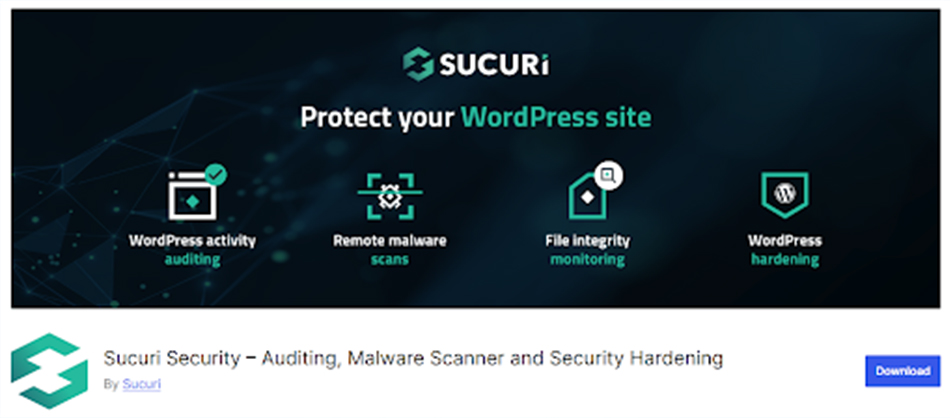
Sucuri is a premium security solution with an advanced level of protection. It has its strength in server-side scanning and professional malware cleanup services.
Key Features:
- Server-Side Malware Scanning: Scans the site from the server level, which gives detailed detection.
- Firewall Protection: Filters out the malicious traffic and attacks.
- Brute-Force Attack Protection: Secure WordPress pages from repeated login attempts.
- Geo-Blocking & IP Whitelisting: Customize access controls by region.
- Complete Malware Service: Experts clean up your site with great speed and precision.
| Pros: | Cons: |
|---|---|
|
|
Why Sucuri Stands Out: Sucuri is a good option when it comes to professional malware removal with solid firewall protection. Best suited to those businesses that seek expert intervention over DIY solutions.
2. Wordfence Security – Best Free Option
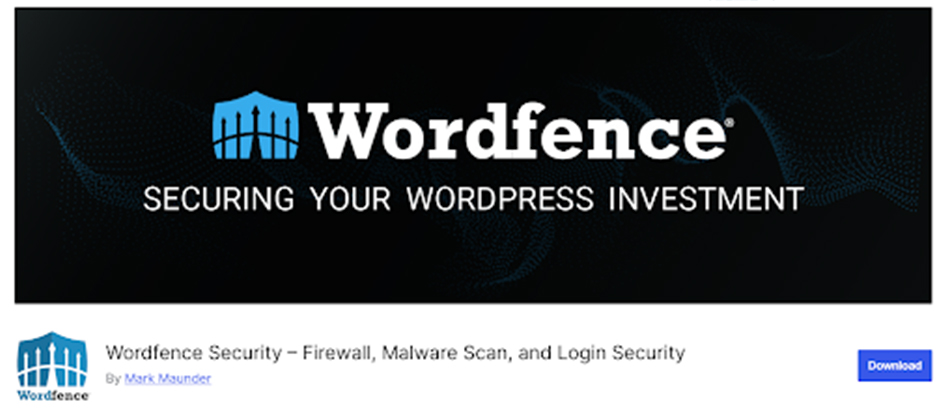
Wordfence is among the most popular free WordPress security plugins, widely used for small to medium websites. Its free version comprises malware scanning, brute force protection, and firewall features.
Key Features:
- Malware Scanner: Checks files, themes, and plugins against a massive signature database.
- Endpoint Firewall: Blocks malicious traffic directly on your server.
- Login Security: Two-factor authentication and brute force protection.
- Country Blocking & Reputation Checks: Restrict access from high-risk regions and monitor site reputation.
| Pros: | Cons: |
|---|---|
|
|
Why Wordfence Stands Out: Wordfence works best on low-traffic sites or small businesses on a budget. Its free version is surprisingly effective, however, to be completely safe, one should use premium features. It is especially suitable for users who want to manage security manually.
3. MalCare – Best Overall Security Plugin
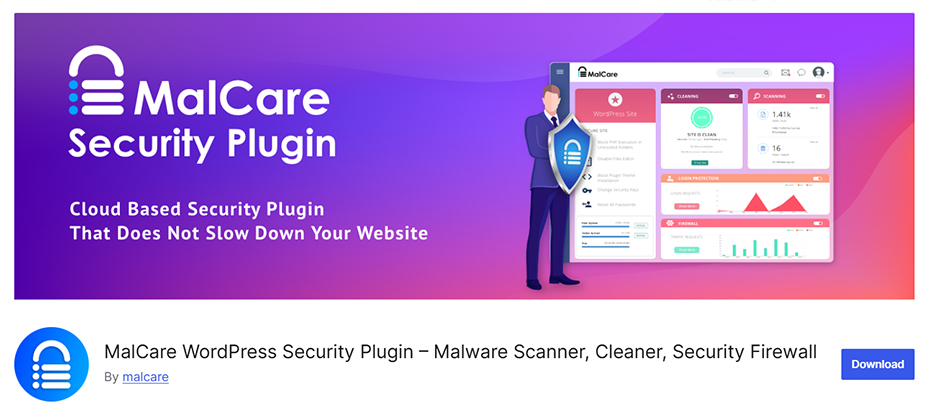
MalCare has always been ahead of its competitors in detecting and eliminating malware and optimizing performance. It is suitable for both small and high-traffic websites, offering hands-off, automated protection.
Key Features:
- Thorough Malware Check: MalCare scans every file and database entry and identifies even cleverly hidden malware.
- One-Click Malware Removal: Removes every trace of malware quickly without compromising site performance.
- Intelligent Firewall: Intercepts malicious bots and suspicious traffic before accessing your site.
- Login Protection & Brute-Force Attack Prevention: Secures your admin panel against unauthorized access.
- Vulnerability Detection: Monitors outdated plugins, themes, and WordPress core files.
- Uptime Monitoring & Activity Log: Checks the availability of your site and records all the activity.
- Backups, Staging, and Migration: Integrates security with site management and recovery.
- Geo-Blocking / IP Whitelisting: Restrict access from high-risk regions or allow trusted IPs only.
| Pros: | Cons: |
|---|---|
|
|
Why MalCare Stands Out: MalCare features in-depth malware detection, automatic cleanup, and an intelligent firewall, which do not slow down your site. In contrast with other plugins, it has actionable alerts, which allow you to understand what should be done. MalCare can be used as a full solution to high-value or business-critical sites.
4. SolidWP – All-in-One Security & Site Management
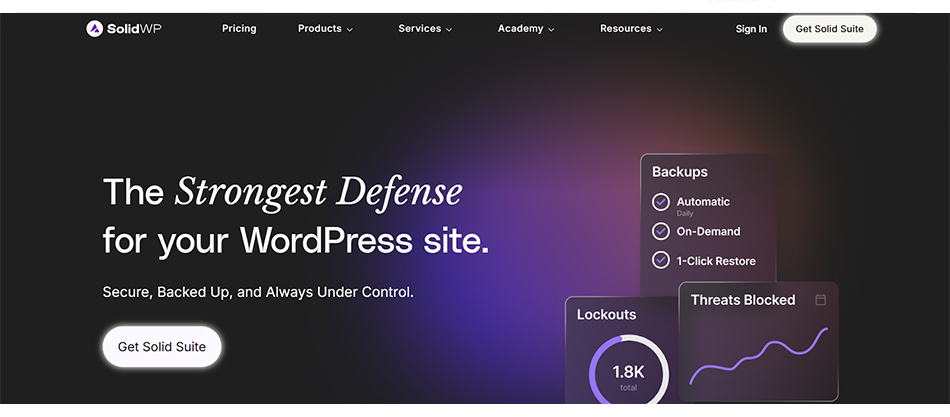
SolidWP is positioned as a multi-tool approach: security features plus backups, version control, and site management. To users who value more than malware scanning/firewall, this WordPress safety plugin tries to give you several layers of defense and maintenance within a single dashboard.
Key Features:
- Login Security: Two-factor authentication, CAPTCHA, and brute force protection to secure logins.
- Activity Monitoring: File change detection and detailed user activity logs for monitoring suspicious behavior.
- Automated Backups & Updates: Automated backups and update management to keep your site current and safe.
- Access Control: IP blocking and geo-blocking to control access from high-risk regions.
- Performance Monitoring: Site performance monitoring and uptime alerts to ensure your website runs smoothly.
- Centralized Management: A centralized dashboard for managing multiple security and maintenance tasks without switching plugins.
| Pros: | Cons: |
|---|---|
|
|
Why SolidWP Stands Out: SolidWP is not merely an attack blocker, but also integrates security, backups, and updates in one pack. Most WordPress plugins are just part of the puzzle, such as malware scanners or firewalls. SolidWP is unique as it assists in preventing the hacks even before they occur by ensuring that your site is updated, backed up, and locked down at the login level.
5. Jetpack Security – Best for WordPress.com Integration
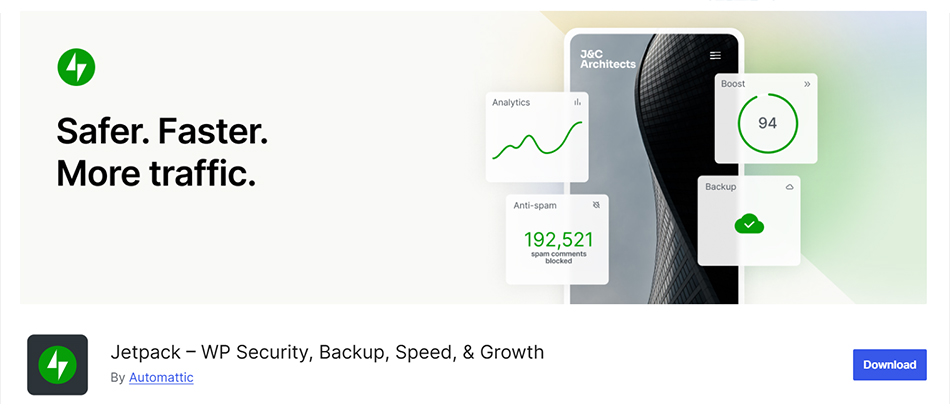
Jetpack is a combination of security, performance, and site maintenance. It used to be called VaultPress and is especially helpful with WordPress.com users.
Key Features:
- Activity Logs: Monitor website changes, such as plugin updates, theme changes, and content edits, giving you full visibility over site activity.
- Brute-Force Attack Protection: Prevents unauthorized login attempts by limiting repeated login tries.
- Downtime Monitoring: Sends instant alerts if your site goes offline, helping you respond quickly.
- Malware Scanning: Checks file modification as well as vulnerabilities in order to discover potential threats early.
| Pros: | Cons: |
|---|---|
|
|
Why Jetpack Stands Out: Jetpack serves best when you want an all-in-one maintenance and security solution. To guard against serious malware, it must be combined with a dedicated WP security plugin.
6. All-In-One WP Security & Firewall – Free Beginner-Friendly Option
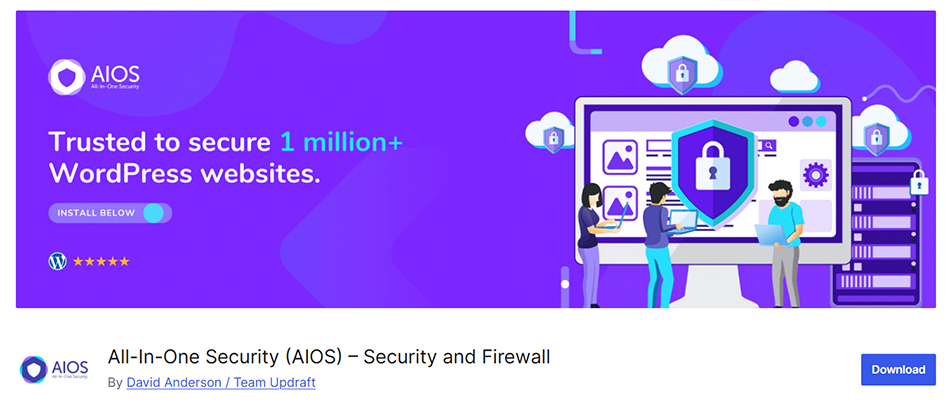
All-In-One WP Security (AIOS) is a free plugin offering basic security, firewall, and login protection. It is user-friendly in terms of its visual interface.
Key Features:
- File Change Detection: Checks core WordPress files and notifies you when unauthorized changes are detected to avoid hacking attempts.
- Brute-Force Login Defense: Limits failed login attempts to protect against password-guessing attacks.
- Spam Protection: Blocks comments and spam automatically so that your site becomes clean.
- Firewall for .htaccess Files: Adds basic firewall rules to safeguard your website from malicious traffic.
- User Account Security: Promotes the use of strong passwords and keeps track of user account activity to identify suspicious activity.
| Pros: | Cons: |
|---|---|
|
|
Why AIOS Stands Out: Unlike high-value sites, AIOS is a good beginner-friendly alternative. It teaches users the basic security measures without confusing them with advanced features.
7. Cloudflare – Best for Performance-First Security
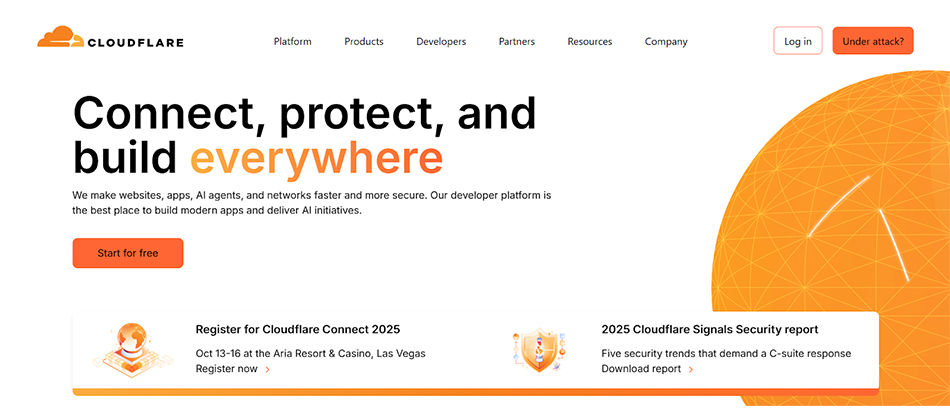
Cloudflare is a well-known service provider that can provide a global Content Delivery Network (CDN), DDoS protection, as well as a Web Application Firewall (WAF). Its WordPress plugin makes all these features part of your site so they can be managed easily.
Key Features:
- Global CDN: Accelerates your site by distributing content worldwide.
- DDoS Protection & WAF: Prevents DDoS attacks such as SQL injections and malicious traffic.
- SSL/TLS Encryption: Free SSL certificates improve security and SEO.
- Automatic Cache Purge & Analytics: Makes sure people see the most recent content and protects against threats.
| Pros: | Cons: |
|---|---|
|
|
Why Cloudflare Stands Out: It is best suited for fast and secure WordPress sites. It safeguards against attacks and enhances performance, which is why it is appropriate for both small and large websites.
8. CleanTalk Security – Specialized Spam & Bot Protection
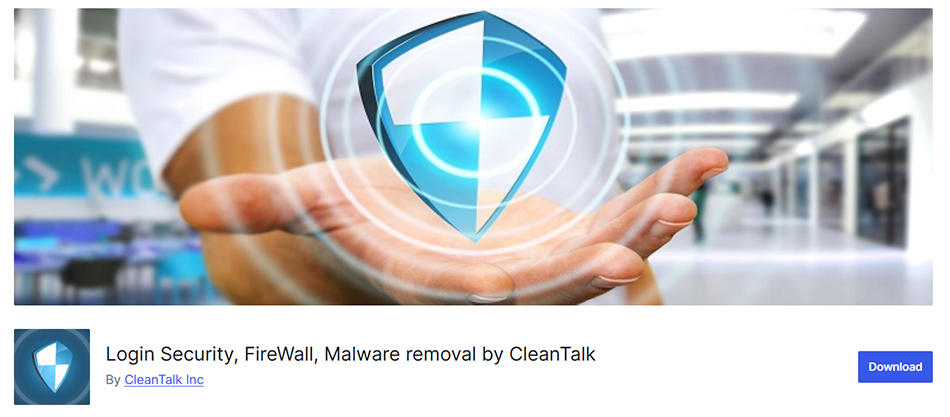
CleanTalk is a lightweight plugin that specializes in spam removal and bot protection, complementing a comprehensive security plugin.
Key Features:
- Spam and Bot Protection: Blocks spam comments, user account registration, and contact form entries to keep your site clean.
- IP and Geo-Blocking: Restrict access from suspicious IPs or entire regions to prevent malicious activity.
- Audit Logs: Maintains detailed logs of blocked attempts and user activity for monitoring and analysis.
- Login Security: Protects your login forms from brute-force attacks and suspicious login attempts.
- Web Application Firewall: Adds an extra layer of security to filter malicious traffic before it reaches your site.
| Pros: | Cons: |
|---|---|
|
|
Why CleanTalk Stands Out: Perfect as a supplemental plugin to counter spam and bot attacks. It is not an appropriate standalone security solution.
Final Thoughts
Choosing the appropriate WordPress security plugin in 2025 is among the key decisions in regard to your website and your business. The effects of a security breach are not restricted to downtime alone; they can impact your revenue, SEO rankings, customer trust, and overall brand reputation.
MalCare represents the most balanced solution for most website owners. The combination of thorough malware detection, a single-click cleanup, smart firewall, and negligible effect on its efficiency makes it suitable enough for users of any level. Wordfence is also a worthy free option, but it is an excellent choice when the site is small in scale or low-budget. In the meantime, Sucuri serves clients who require an advanced service with 24/7 support and full surveillance.
Bear in mind, a security plugin is not a complete strategy. Frequent updates, a robust password, two-factor authentication, and a high number of backups can help to keep your site secure. Investing in a trusted security plugin is not just about preventing hacks today – it’s about safeguarding your visitors, preserving your revenue, and maintaining your brand’s credibility for years to come.
Frequently Asked Questions
Do I need a security plugin for my WordPress website?
Are free WordPress security plugins effective?
Which WordPress security plugin is best for beginners?
What are the best WordPress security plugins in 2025?
- MalCare- Best malware detection and one-click cleanup.
- Cloudflare- Ideal in terms of performance and DDoS protection with a global CDN.
- Sucuri- Premium complete solution plus professional support.
- Wordfence- Best free firewall plugin and malware scanner.
- SolidWP- One size fits all: Backups, monitoring, and security hardening.
- All-In-One Security (AIOS)- Free tool that is best in terms of login and spam protection.
- Jetpack Security- Perfectly combined with backups and monitoring alongside security.
Can security plugins protect E-commerce WordPress sites?
How often should I scan my website for malware?
Can I rely only on a plugin to keep my site safe?
- Keep WordPress themes, core, and plugins updated.
- Use passwords that are very strong and enable two-factor authentication.
- Limit user roles and permissions.
- Frequently back up your site with a tool such as Jetpack or SolidWP.












































